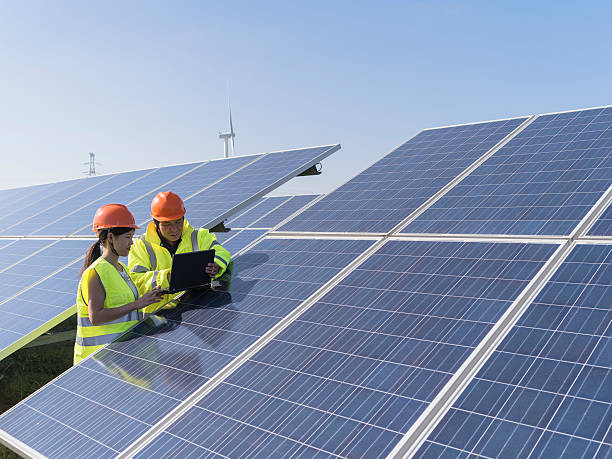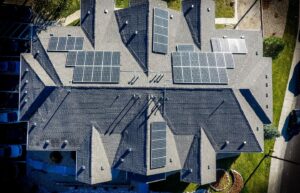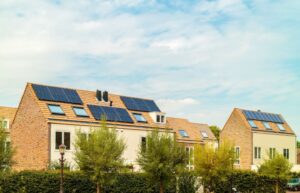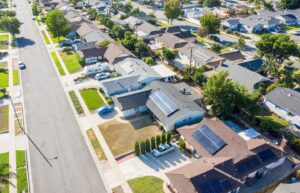Have you ever wondered if solar energy is good for the environment and why it can help reduce greenhouse gasses? Did you know that by investing in solar panels, you can save money on your electricity bill and contribute to a cleaner future? Well, let’s delve into the world of solar power and explore its benefits together.
Solar panels harness the power of the sun to generate clean and renewable energy, reducing your carbon footprint and helping Solar energy is a renewable source of power derived from the sun, making it an abundant and clean form of energy that can be harnessed for various purposes. It is particularly beneficial for the electric company industry, as it allows for the utilization of advanced technologies such as batteries.
Solar energy systems are becoming increasingly popular among businesses and consumers in places like Littleton, Colorado. Homeowners and panel manufacturers are recognizing the benefits of harnessing solar power for residential and commercial use.
These solar technologies not only provide sustainable electricity but also help homeowners save money on their utility bills. Solar panels and solar batteries are key components of these systems. Moreover, by using solar power from a panel system instead of conventional sources, we contribute to a cleaner home environment by reducing carbon emissions from the roof.
In the following sections, we will explore the advantages of solar energy systems for home roofs and discuss how they can positively impact both individuals and the planet as a whole.
The Advantages Of Solar Energy

Solar energy offers numerous benefits for our home’s energy needs, making it a viable and attractive option. With a solar roof system, we can harness the power of the sun to generate electricity and reduce our reliance on the traditional grid. From reducing reliance on fossil fuels to providing sustainable solutions, solar power has proven to be an efficient and environmentally friendly source of renewable energy for your home’s roof system.
Reducing Reliance on Fossil Fuels
One of the primary advantages of solar energy is its ability to reduce our dependence on fossil fuels at home through the use of a solar system. As we all know, burning fossil fuels releases harmful greenhouse gases into the atmosphere, contributing to climate change. However, adopting home solar systems can help reduce our reliance on fossil fuels and harness clean solar energy.
By installing a solar panel, you can contribute to a sustainable future and minimize the negative impact of traditional energy sources on the environment. By harnessing the sun’s power, solar energy systems produce electricity without producing any emissions or pollutants in the comfort of your home. Using a home solar system, this clean and green approach helps combat climate change and reduces our carbon footprint by harnessing solar energy.
Sustainability for Long-Term Energy Needs
Another key advantage of solar energy is its sustainability. Unlike finite fossil fuel resources, home solar is abundant and will continue to shine for billions of years. The sun’s energy can be harnessed through a solar system, providing a sustainable and renewable source of power for homes and businesses.
By investing in solar power, we can tap into this virtually limitless source of energy and ensure a long-term solution for our home’s ever-growing electricity demands. This not only provides stability for your home’s solar system but also helps secure a sustainable future for generations to come.
Minimal Maintenance and Remote Accessibility
Solar panels require minimal maintenance once installed, making them an ideal choice for both home and commercial applications. Unlike traditional power plants, solar panels at home have no moving parts that can wear out or break down easily. They require no regular upkeep or repairs. This translates into significant cost savings over time.
Moreover, solar energy systems can generate electricity even in remote areas where access to the home grid may be limited or nonexistent. This opens up possibilities for powering off-grid locations such as cabins in rural areas or scientific research stations in isolated regions with home solar systems. With its sunny climate, Littleton, Colorado (Littleton, CO) presents an excellent opportunity for residents to embrace this advantage by utilizing solar panels effectively.
The Disadvantages Of Solar Energy
Initial Installation Costs Can Be High, Although They Are Decreasing Over Time
Solar energy is undoubtedly a sustainable and environmentally friendly source of power. However, one of the main drawbacks that has deterred many homeowners from embracing solar energy is the initial installation cost. Setting up a solar power system requires purchasing solar panels, inverters, batteries (if necessary), and other equipment. These home solar expenses can add up quickly and become a barrier for those on a tight budget who are considering installing a solar system.
Fortunately, as technology advances and the demand for solar energy increases, installation costs have steadily declined. In fact, more affordable options are now available in places like Littleton, Colorado, where solar energy has gained popularity among residents. Many companies offer leasing or financing programs that allow homeowners to install solar panels without bearing the brunt of the upfront costs.
Solar Power Generation Depends On Sunlight Availability, Making It Intermittent
While solar energy has numerous benefits, its reliance on sunlight also poses certain limitations. The amount of electricity generated by solar panels is directly proportional to the intensity and duration of sunlight exposure. This means that during cloudy days or at night when there is no sunlight available, solar power generation may be significantly reduced or even nonexistent.
To mitigate this issue, some households opt for hybrid systems that combine solar panels with traditional grid-connected electricity. These systems allow users to draw electricity from the grid when needed while still benefiting from their solar panels during sunny periods. Advancements in home solar and battery storage technology have allowed storing of excess electricity generated by a solar system during peak hours for use during low-light conditions.
The Production Process Of Solar Panels Has Some Environmental Impact
While using renewable energy sources like solar power helps reduce greenhouse gas emissions and combat climate change in the long run, it’s important to acknowledge that environmental consequences are associated with manufacturing solar panels. The production process for home solar requires extracting and processing raw materials, such as silicon, which can have detrimental effects on ecosystems if not managed responsibly.
However, it’s worth noting that the environmental impact of solar panel production is relatively small compared to traditional energy sources like coal or natural gas. Ongoing research and development efforts in the home solar industry are focused on improving manufacturing processes to minimize waste generation and reduce the use of harmful chemicals.
Benefits of Installing Solar Panels on Your Home
Installing solar panels on your roof can have a multitude of benefits. From reducing your electricity bills to increasing the value of your property, there are plenty of reasons why homeowners in Littleton, CO, and beyond are embracing solar energy.
Reduce Your Electricity Bills
One of the most significant advantages of installing solar panels is the potential for substantial savings on your electricity bill. By harnessing the power of the sun, you can generate clean and renewable energy right at home.
This means that with home solar, you’ll rely less on traditional grid-supplied electricity, resulting in lower monthly bills. With Littleton’s abundant sunshine, homeowners have an ideal opportunity to tap into this cost-saving advantage.
Increase Property Value And Tax Incentives
Investing in solar panels is not only a smart financial move but also a way to boost the value of your property. Homes equipped with solar panels tend to attract more buyers due to their energy efficiency and reduced operating costs.
Certain tax incentives and rebates may be available for homeowners who install solar panels. For instance, the Federal Solar Tax Credit allows eligible homeowners to claim a percentage of their installation costs as a credit on their federal taxes.
Energy Independence from the Grid
By generating your own electricity through solar panels, you become less reliant on the grid for power supply. This newfound energy independence provides several advantages. First and foremost, it offers peace of mind during power outages or disruptions in service since you’ll still have access to electricity stored in your home battery system.
Second, it reduces strain on the electrical grid during peak demand periods when everyone else is drawing power from it. Additionally, home solar systems help alleviate pressure on the electrical grid during times of high demand.
Environmental Benefits
In addition to financial advantages, going solar contributes positively to our environment by reducing carbon emissions and reliance on fossil fuels for electricity generation. Traditional methods of producing electricity at home often release harmful greenhouse gases that contribute to climate change.
Home solar systems provide a clean and sustainable alternative to traditional electricity production methods. By switching to clean energy sources like solar power, homeowners can play a vital role in reducing their carbon footprint and creating a more sustainable future.
The Top Four Benefits of Solar Panels
Lowering The Carbon Footprint By Reducing Greenhouse Gas Emissions
Solar panels offer a significant advantage. By harnessing the power of the sun, solar energy systems generate electricity without producing harmful greenhouse gas emissions. Unlike traditional fossil fuel-based energy sources, solar panels do not release carbon dioxide or other pollutants into the atmosphere during operation. This means that using solar energy helps combat climate change and reduces air pollution, making it a cleaner and greener alternative.
Saving Money In The Long Run Through Reduced Utility Bills
One of the most compelling reasons to invest in solar panels is the potential for long-term cost savings. While the upfront installation costs may seem daunting, solar panels can significantly reduce your monthly utility bills over time.
By harnessing the power of home solar, you can generate electricity from sunlight and reduce your dependence on grid-supplied power. With this renewable energy source, you can take advantage of free energy from the sun. As a result, your reliance on expensive electricity from traditional sources decreases, leading to substantial savings in the long run.
Moreover, many governments and utilities offer incentives such as tax credits or net metering programs that further enhance the financial benefits of going solar. Net metering allows you to sell excess energy back to the grid, offsetting your overall electricity costs even more.
Providing A Reliable Source Of Electricity During Power Outages Or Emergencies
Solar panels provide an invaluable source of backup power during blackouts or emergencies when traditional electrical grids may be compromised. With battery storage systems becoming increasingly popular alongside solar installations, homeowners can store excess energy generated during sunny periods and use it when it is most needed.
This ensures that critical appliances like refrigerators, medical equipment, or communication devices remain functional even when there is no access to a conventional electricity supply.
Contributing To A More Sustainable Future By Supporting Renewable Energy Sources
Opting for solar panels goes beyond personal benefits; it actively contributes to building a more sustainable future for our planet. By choosing solar energy, you support the transition to renewable energy sources, reducing our dependence on finite fossil fuels. This shift towards clean energy is crucial for mitigating climate change and preserving the environment for future generations.
Solar panels also serve as a symbol of environmental consciousness, inspiring others to consider adopting renewable energy solutions. By leading the way in sustainable practices, you become an advocate for positive change and contribute to a broader movement towards a cleaner and greener world.
Pros and Cons of Solar Panels
Pros
Solar panels have gained immense popularity in recent years, and for good reason. Here are some of the key advantages they offer:
Renewable And Environmentally Friendly Sources Of Energy
One of the biggest pros of solar panels is that they harness the power of the sun, a renewable energy source that does not deplete natural resources or contribute to harmful emissions. By relying on solar energy, we can significantly reduce our carbon footprint and combat climate change.
Long Lifespan With Low Maintenance Requirements
Solar panels typically have a lifespan of 25 to 30 years, making them a long-term investment. Furthermore, they require minimal maintenance once installed. Occasional cleaning to remove dirt or debris is usually sufficient to keep them operating efficiently.
Potential Financial Savings Through Net Metering Or Selling Excess Electricity
Installing solar panels can lead to substantial financial benefits. Net metering allows homeowners to sell any excess electricity generated back to the grid, reducing utility bills or even generating potential income. Certain states, like Littleton, CO, offer incentives such as tax credits or rebates that further enhance cost savings.
Cons
While solar panels have numerous advantages, it’s important to consider their drawbacks as well.
High Upfront Costs For Installation
The initial investment required to install solar panels can be significant. While prices have decreased over time, they still represent a considerable expense for many homeowners. However, it’s worth noting that this cost can often be offset by long-term savings on utility bills.
Dependence On Sunlight Availability Affects Consistent Power Generation
Solar panels rely on sunlight to generate electricity; therefore, their efficiency is directly impacted by weather conditions and geographic location. Areas with frequent cloud cover or limited direct sunlight may experience reduced power production compared to sunnier regions like Littleton, Colorado.
Limited Efficiency In Certain Weather Conditions Or Geographic Locations
Extreme weather conditions, such as heavy snowfall or intense heat, can affect the performance of solar panels. In snowy areas, accumulation on the panels can hinder sunlight absorption, while excessive heat can reduce their efficiency. However, advancements in technology have led to improvements in the resilience and adaptability of solar panels.
Evaluating the Potential of Solar Energy
Solar energy is gaining popularity as a sustainable and renewable source of power. As more people recognize its benefits, evaluating the potential of solar energy for individual homes and businesses becomes essential. By assessing various factors such as location, government incentives, return on investment, and payback period, one can determine if solar energy fits their needs.
Assessing Solar Panel Feasibility
The feasibility of installing solar panels depends on several factors. Firstly, the location plays a crucial role in determining the amount of sunlight received throughout the year. For instance, residents in Littleton, Colorado, enjoy an average of 300 days of sunshine annually, making it an ideal location for solar energy production. Considering factors like roof orientation and shading is vital to ensuring maximum efficiency from solar panels.
Government Incentives And Policies
Government incentives and policies can significantly impact the adoption of solar energy. In Littleton, CO., there are various initiatives that support renewable energy sources like solar power. These incentives may include tax credits or rebates that reduce the cost burden on consumers interested in installing solar panels. Such policies not only encourage individuals to embrace clean energy but also contribute to reducing greenhouse gas emissions.
Evaluating Return on Investment
One important aspect to consider when evaluating the potential of solar energy is the return on investment (ROI) and payback period. While upfront costs may seem significant initially, savings from reduced electricity bills can offset these expenses over time. Calculating ROI involves analyzing both the short-term and long-term benefits of generating electricity through solar panels.
To determine ROI accurately:
- Calculate installation costs, including equipment purchases and installation fees.
- Consider the ongoing maintenance costs associated with maintaining optimal performance.
- Estimate annual savings by comparing current electricity bills with projected savings after installing solar panels.
- Factor in any applicable tax credits or rebates provided by the government.
- Determine the payback period by dividing the total installation cost by the annual savings.
The Impact on Energy Production and Emissions
Solar energy positively impacts energy production and reduces greenhouse gas emissions. By harnessing sunlight to generate electricity, solar panels contribute to a cleaner environment. They provide an alternative to traditional fossil fuel-based power plants that release harmful emissions into the atmosphere. Embracing solar energy helps combat climate change and reduces reliance on non-renewable resources.
Exploring the Future of Solar Power
Advancements in solar technology have paved the way for a brighter future powered by renewable energy. With innovations such as thin-film and perovskite cells, the efficiency of solar power systems has seen remarkable improvements. These cutting-edge technologies offer promising solutions to address the challenges faced by traditional solar panels.
Greater Flexibility And Versatility
Thin-film solar cells, for instance, are made from layers of photovoltaic materials that are significantly thinner than conventional silicon-based panels. This allows for greater flexibility and versatility in their application.
Thin-film cells can be integrated into various surfaces like windows, roofs, or even clothing, enabling seamless integration of solar power generation into our everyday lives. These cells perform better under low-light conditions compared to their counterparts, making them ideal for areas with less sunlight exposure.
Cost-Effective And Easy Manufacturing
Perovskite cells have also emerged as a game-changer in the field of solar technology. These cells are made using a unique crystal structure that enables them to absorb a wider range of light wavelengths, increasing their overall efficiency. Moreover, perovskite materials are cost-effective and easier to manufacture compared to traditional silicon-based panels. Although still in the experimental stage, perovskite technology shows great potential for revolutionizing electricity production from sunlight.
Continuous Electricity Supply
Another key aspect driving the future of solar power is the integration of energy storage systems with solar installations. The ability to store excess energy generated during daylight hours allows for continuous electricity supply even after sunset or during cloudy days.
Battery storage plays a crucial role in this integration by storing surplus energy and releasing it when it is most needed. Combining solar power systems with battery technologies can enhance reliability and reduce dependence on fossil fuels.
Larger-Scale Investments
Community solar projects and shared renewable energy models are also gaining traction across various regions worldwide. These initiatives allow multiple consumers within an area to collectively invest in larger-scale solar installations while sharing the benefits equally among themselves.
In places like Littleton, Colorado, for example, residents can join forces to establish a community solar power system. This not only promotes sustainable energy practices but also provides affordable access to clean electricity for those who may not have th e means to install individual solar panels.
The adoption of these shared renewable energy models is driven by their potential to democratize solar power and make it accessible to a wider consumer base. It empowers communities to take charge of their energy needs while reducing their reliance on traditional electric companies. These initiatives also contribute to the overall stability of the grid by decentralizing electricity production and distributing it across various local sources.
Conclusion: Is Solar Energy Good And Why?
So, is solar energy good? Absolutely! Solar energy offers numerous advantages that make it a great choice for both individuals and the environment.
From reducing electricity bills to decreasing carbon emissions, solar power provides a clean and sustainable source of energy. Although there are some disadvantages to consider, such as initial installation costs and intermittent availability, the benefits far outweigh the drawbacks.
If you’re considering installing solar panels on your home, now is the time to take action. Not only will you be able to enjoy significant savings on your electricity bills in the long run, but you’ll also be contributing to a greener future. By harnessing the power of the sun, you can reduce your reliance on fossil fuels and make a positive impact on the planet.




